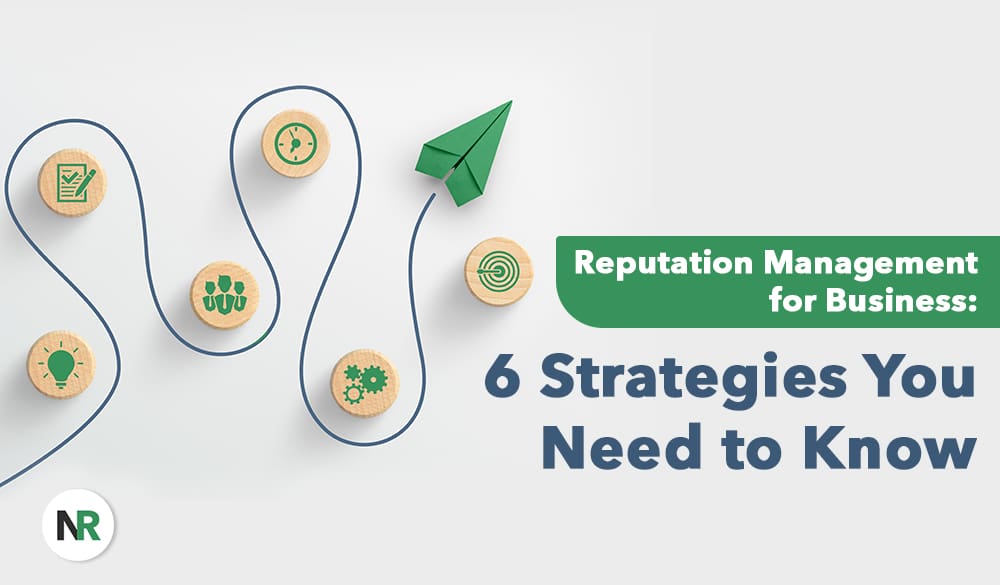Your company’s online image is a critical part of your pathway to success, which is why you should prioritize reputation management for business. Online reputation management can help you build a positive brand image and reach your goals.
Over the past two decades, consumer behaviors have experienced a dramatic shift. In the past, print and television advertising helped shape purchasing behaviors. Today, the digital world dominates, with more and more consumers turning to the web for information about businesses before making purchasing decisions.
More than 93% of online shoppers read reviews before making an online purchase. Plus, over 76% of internet users go on social media to learn about brands and products.
In the digital environment, your business reputation is of the utmost importance. As the leading online reputation management service provider, NetReputation knows that with a positive reputation, you can improve revenue streams, increase market penetration, and build trust between you and your customers.
In this guide, we will explore six of the top strategies for brand reputation management to help you stand out in your industry. From social media to public relations, review management, and more, each of these strategies can be combined to put you on a path toward long-term business success.
Request a Free Consultation
The Value of a Positive Online Reputation
Today’s consumer typically turns to Google or other popular search engines to learn about businesses in their area. According to BrightLocal, 91% of consumers say their overall perception of big brands is impacted by reviews of local branches.
Evaluating search results is the first part of the customer journey, where your brand’s public perception has an immediate influence on future purchasing behaviors. Furthermore, what these potential customers find in search results can have a profound effect on their perceptions of a given company.
Your business reputation online is built on numerous factors, including:
- Quality and quantity of online reviews
- Customer sentiments on social media networks like Facebook, X, and LinkedIn
- Consumer ratings on Google, the Better Business Bureau, and third-party review sites
- Positive news articles or positive content on blogs, websites, and industry resources
- Perceptions of corporate social responsibility
- Visibility in business and industry directories
With a good reputation management strategy, your business has the potential to improve consumer trust. Moreover, with a great reputation, you’re positioning your company for long-term success. Consider the advantages of a positive online presence:
- Firstly, a positive online image boosts sales. Reviews matter more to customers than pricing and discounts, and customers will pay more for the same item from a company with good reviews versus one with no reviews.
- Secondly, a positive reputation builds and reinforces your brand image. This image is critical in shaping consumer behaviors.
- Also, your reputation enhances visibility in online search results. Companies with great reputations stand out in searches, securing the top rankings where customers are more likely to find you.
- Lastly, a positive online reputation builds trust, loyalty, and credibility with your target audience. Trust is an essential component of a company’s digital presence and has been shown to improve the acquisition of new customers.
Your company’s reputation online stands between you and continued success in your industry. Can you really afford not to do what it takes to develop, build, and protect this critical aspect of your digital footprint?
How Can a Poor Reputation Hurt My Business?
Whether you like it or not, customers are talking online about you and your business. This conversation includes comments on social media, blog posts, and personal interactions with others. This customer feedback is directly tied to your online reputation.
What if your online reputation is less than flattering? What if your business has experienced negative reviews, unflattering news coverage, or embarrassing crises that have undermined trust in your operation? These factors can harm your potential for growth and revenue.
Just how damaging is a negative business reputation? Consider these statistics:
- Almost 62% of online shoppers search for a company online if they’re not familiar with it, and very few of them will make a purchase if negative reviews show up on the search results page.
- 90% of online shoppers won’t purchase from a company with a poor reputation.
- 64% of consumers stop buying from a brand after learning that the company treats employees poorly.
Local businesses are at an even greater risk of the negative effects of a bad reputation. Small business owners depend on their reputations to grow brand awareness and to bring new customers to the door.
In today’s digital world, your online reputation can help — or hinder — your chances for success in competitive marketplaces.
Online Reputation Management Services: Information for Business Owners
Your company’s online reputation is a powerful force in shaping consumer behaviors and perceptions. How can you create an environment to take the greatest advantage of this all-important aspect? The answer is online reputation management tools, services and strategies.
What is brand reputation management? In simple terms, it’s the name for a series of processes or strategies to control public perception of your brand online. Online reputation management involves several key areas, including:
- Search engine optimization (SEO)
- Social media management/social media monitoring
- Content creation
- Negative content removal
- Public relations
- Content promotion and marketing
- Review management
- Reputation monitoring
- Crisis management
- Utilizing reputation management tools
Each of these key areas works hand-in-hand with digital marketing and promotion strategies to help business owners build, protect, and repair their online reputations. A company’s online presence is enhanced by the power of reputation management, helping potential customers develop trust in your business online.
What Goes Into ORM?
In today’s competitive business environment, business reputation management is an essential aspect of growing your company. From creating social media accounts to overcoming the challenges posed by a negative review, your brand’s online reputation can be made stronger than ever with the help of a reputation management company or a brand reputation manager.
Every reputation management firm has different approaches, but key factors in creating comprehensive reputation management strategies include:
- Evaluating your current online reputation by analyzing search results and social media mentions for negative content. This process is known as reputation analysis, and there are online reputation management tools that can help.
- Developing web properties to establish or expand your digital footprint. Web properties include websites, blogs, social media profiles, Wikipedia pages, and image-sharing profiles, among many other options.
- Content creation to improve visibility on search engines and to build your brand reputation online. Content is developed with a keen eye toward SEO and is designed to engage, inform, and entertain your online community. The best reputation management firms create positive content in the form of blog posts, social media posts, executive bios, press releases, and interviews. Video content creation has also been shown to have a dramatic impact on public perceptions of you and your company’s reputation.
- Content publishing to share your information with others. Content is published on a regular schedule to satisfy search algorithms and improve engagement with your followers in the digital environment.
- Content promotion to ensure a successful online reputation management process. The best online reputation management providers use a variety of tools and strategies to promote positive content, including owned, earned, and paid promotional channels.
Business reputation management is a complex process, but your brand’s reputation depends on it to achieve visibility in the digital environment. Prospective customers use the information found in search results to make critical purchasing decisions. Doesn’t it make economic sense to focus your efforts on improving your brand with reputation management online?
6 Critical Strategies for Business Reputation Management
In today’s highly competitive business world, any advantage a business owner can gain over his or her competitors is valuable. Reputation management is one of these advantages, allowing business owners to build brand awareness, shape consumer perceptions, and drive business growth.
The following are six critical parts of a reputation management strategy, helping your business to create a robust digital presence while supporting your digital marketing efforts.
1. Google Business Profile
Google Business Profile is a free listing service provided by the search engine leader. Business owners can claim a listing and then populate the listing with company information to help potential customers learn more about your products and services, operating hours, brick-and-mortar locations, and more. In today’s competitive digital environment, having a Google listing gives you incredible advantages, helping you stand out in search and on Google Maps.
2. Search Engine Optimization (SEO)
SEO is the practice of optimizing web properties to stand out in search results. SEO incorporates on- and off-page factors to help the search algorithms accurately categorize and index information.
Google wants to deliver relevant results to its users. SEO facilitates this process, helping create visibility for your company online.
For the small business owner, local SEO is used to improve visibility in local searches, which have become a daily practice of Google users around the globe. Local SEO gets you noticed where it matters most: with customers in your area.
3. Social Media
Over the past decade, social media has risen in popularity and become one of the most powerful online reputation management tools. Furthermore, what’s even more valuable for business owners is social media’s ability to provide new channels for marketing and promotion.
If you’re not on social platforms already, you’re missing out on one of the best ways to effectively manage your online reputation. Consider social channels like Facebook, YouTube, X, and LinkedIn to be essential parts of a robust reputation management strategy.
4. Online Review Management
In an earlier section, we presented the power of online reviews and how positive reviews or negative reviews can influence purchasing behaviors. Positive reviews are important. On the other hand, every reputation manager knows that fake reviews or reviews left by angry customers can erase your great reputation.
A positive review profile is all but impossible without management. As part of a broad reputation management strategy, online review management is a vital component.
Review management includes creating a review response strategy that encourages more positive reviews to be posted by your consumers. It also helps to counteract the damage caused by negative online reviews.
Reputation management software used by leading firms automatically searches the web for unflattering, false, or defamatory reviews, helping you to identify those online reviews that are putting your reputation at risk. By flagging and removing negative content, you control the digital conversation.
5. Public Relations
Long a part of advertising, public relations (PR) is as important in the digital environment as your other marketing practices and online reputation management tools. In simple terms, good PR can make you look better, while great PR changes buying behavior.
PR helps to create positive relationships between businesses and their customers. It also improves online visibility, particularly in Google results. With a public relations strategy as part of your reputation management online, you can stand out from the pack and drive consumers right to your door.
6. Reputation Monitoring
With the above internet reputation strategies, you have created a robust, powerful digital presence. Unfortunately, the work doesn’t end there. Threats can emerge at any time via social posts, unflattering news articles and images, crises, bad business reviews, and more.
Reputation monitoring allows you to identify those threats before they can cause harm. Automated tools scour the web for mentions of your business. Think of monitoring as a proactive reputation management approach, giving you time to react before negative content ruins your chances of success.
We offer ORM solutions for individuals as well as businesses. Get started today with a free consultation with one of our experts. Call us at 844-461-3632 or fill out the contact form below.
Choosing a Reputation Management Company for Your Business Needs
There are many choices when it comes to business reputation management, and just as many companies offer their services to business clients.
Unfortunately, there are bad reputation management service providers out there. How can you be sure you’re getting the best value for your budget? To evaluate the quality of a potential business reputation management company, ask them these questions:
Will a dedicated account manager handle my reputation management needs? A manager can help ensure that all of the components you need are included to help reinforce a positive, robust digital reputation.
What’s included in your contract? Not every business needs the same type of ORM strategy. A quality service provider will tailor your contract to your unique needs and goals.
What is the timeframe for improving my business reputation? Results tend to occur relatively quickly. However, for a strategy to provide the best benefits, your reputation manager will share expected timeframes with you.
Contact NetReputation for Business-Oriented ORM Services
As the leading provider of tailored ORM services to businesses and individuals, NetReputation has the tools, technologies, and skills needed to produce great results. We work hard to help you choose the services needed to build your brand identity, reinforce your reputation, or repair reputations damaged by negative information online.
Ready to supercharge your business’s digital reputation? Call NetReputation today at 844-461-3632 or complete the online form below for a free consultation.











